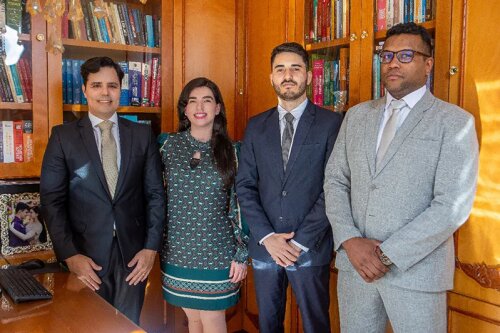Best Sanctions & Export Controls Lawyers in Goiânia
Share your needs with us, get contacted by law firms.
Free. Takes 2 min.
List of the best lawyers in Goiânia, Brazil
About Sanctions & Export Controls Law in Goiânia, Brazil
Sanctions and export controls are legal mechanisms that regulate the international flow of goods, technologies, services, and funds. In Goiânia, and across Brazil, these laws are critical in ensuring compliance with national and international obligations, protecting economic interests, and contributing to global security. Sanctions may involve restrictions imposed by Brazil or international bodies against certain countries, entities, or individuals due to concerns such as human rights violations or threats to peace. Export controls restrict or require authorization for the export or transfer of specific items, particularly those with potential military or dual-use applications.
Why You May Need a Lawyer
The field of sanctions and export controls is complex and can have significant legal and financial consequences. You may need legal assistance if you are:
- A company seeking to export goods, services, or technology from Goiânia to foreign markets
- An importer dealing with restricted or controlled items
- An individual or business that has been notified of a potential sanctions violation
- Facing government investigations or penalties
- Unsure whether your business activities or partners are affected by sanctions or export controls
- Needing guidance to implement compliance programs or internal procedures to avoid legal risks
- Requiring advice on obtaining the proper licenses and permits for export activities
A lawyer specializing in this area can help you navigate the regulatory landscape, respond to authorities, and protect your legal interests.
Local Laws Overview
In Goiânia, sanctions and export controls are governed primarily by federal laws. Key regulations include the Law on Export Controls of Sensitive Goods, the Comprehensive Economic Sanctions Regime, and customs legislation enforced by Receita Federal, the Brazilian Federal Revenue Service. These laws set out the obligations for businesses and individuals to:
- Screen transactions and business partners for sanctioned status
- Apply for permits or licenses to export controlled goods, technologies, or software
- Comply with embargoes and international sanctions adopted by Brazil
- Report suspicious transactions and maintain proper documentation
- Face administrative, civil, or criminal penalties for non-compliance
State and municipal authorities in Goiânia may also play a role in supporting enforcement actions or providing information to the public, but most enforcement authorities and processes are at the federal level.
Frequently Asked Questions
What are export controls, and do they apply to all products?
Export controls are regulations that limit the transfer of certain goods, technology, and services to foreign markets due to security or policy reasons. Not all products are controlled; controls mainly apply to items with military use, dual-use potential, or significant economic or strategic importance.
Who enforces sanctions and export controls in Goiânia?
Enforcement is managed by federal agencies, primarily Receita Federal, the Ministry of Economy, and the Ministry of Foreign Affairs, with cooperation from state and local authorities as needed.
What are the risks of not complying with these laws?
Non-compliance can result in heavy fines, loss of export licenses, business restrictions, criminal prosecution, and reputational damage.
How can I check if my business partner is subject to international sanctions?
You should consult the official sanction lists published by the Brazilian government and international organizations. Legal advisors can assist in screening and due diligence processes.
Do I need an export license to ship goods from Goiânia to another country?
It depends on the type of goods, the destination, and current regulations. High-risk or controlled goods generally require a license from the relevant federal authority.
Can an individual be held personally liable for violations?
Yes, company directors, officers, and individuals can be held personally accountable for intentional or negligent violations of export controls and sanctions laws.
What are some examples of sanctioned countries or entities?
Sanctioned countries or entities change over time, but may include those under United Nations or Brazilian government restrictions due to conflicts, terrorism, or other serious breaches of international law.
How do I apply for an export license in Brazil?
Applications are typically made through the federal government’s licensing portals, with supporting documentation related to the items, their use, and the destination. A legal professional can guide you through the process.
Can sanctions or export control decisions be appealed?
Administrative and some judicial remedies exist if you wish to challenge a decision or penalty related to sanctions or export controls. Legal counsel can assist in filing appeals and representing your interests.
Where can I find updates about changes in sanctions and export controls?
Stay informed by monitoring official publications from government agencies such as Receita Federal and the Ministry of Foreign Affairs, as well as seeking guidance from legal professionals who track regulatory developments.
Additional Resources
If you require further information or assistance, the following resources may be useful:
- Receita Federal: The main federal agency responsible for customs and enforcement of export controls
- Ministry of Foreign Affairs: Issues updates on international sanctions and policy directions
- Ministry of Economy: Manages licensing and regulatory frameworks for exports
- Confederação Nacional da Indústria (CNI): Offers guidance and compliance programs for exporters
- Local business chambers and trade associations: Provide educational events and networking for compliance professionals
Next Steps
If you believe you require legal advice or assistance regarding sanctions and export controls in Goiânia, take the following steps:
- Identify the specific issue or transaction for which you need advice
- Gather relevant documentation, such as contracts, shipping records, and correspondence
- Consult a lawyer or law firm with expertise in export controls and sanctions
- Discuss your situation openly, including any concerns about compliance or possible violations
- Follow the legal recommendations regarding corrective actions, reporting, or licensing
- Establish robust internal compliance procedures to prevent future issues
Early legal intervention can help you address risks, avoid penalties, and protect your business or individual interests within the complex landscape of sanctions and export controls in Goiânia, Brazil.
Lawzana helps you find the best lawyers and law firms in Goiânia through a curated and pre-screened list of qualified legal professionals. Our platform offers rankings and detailed profiles of attorneys and law firms, allowing you to compare based on practice areas, including Sanctions & Export Controls, experience, and client feedback.
Each profile includes a description of the firm's areas of practice, client reviews, team members and partners, year of establishment, spoken languages, office locations, contact information, social media presence, and any published articles or resources. Most firms on our platform speak English and are experienced in both local and international legal matters.
Get a quote from top-rated law firms in Goiânia, Brazil — quickly, securely, and without unnecessary hassle.
Disclaimer:
The information provided on this page is for general informational purposes only and does not constitute legal advice. While we strive to ensure the accuracy and relevance of the content, legal information may change over time, and interpretations of the law can vary. You should always consult with a qualified legal professional for advice specific to your situation.
We disclaim all liability for actions taken or not taken based on the content of this page. If you believe any information is incorrect or outdated, please contact us, and we will review and update it where appropriate.










